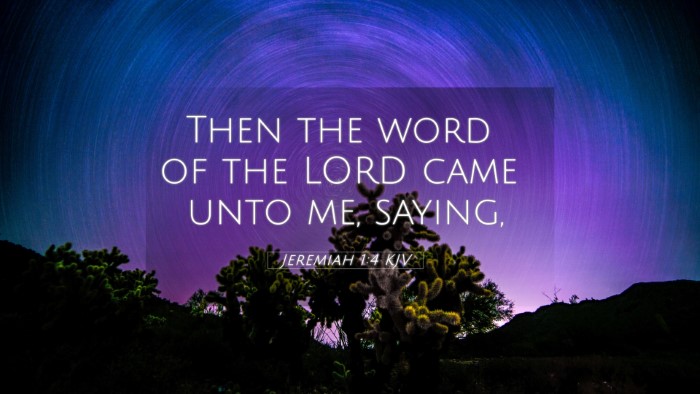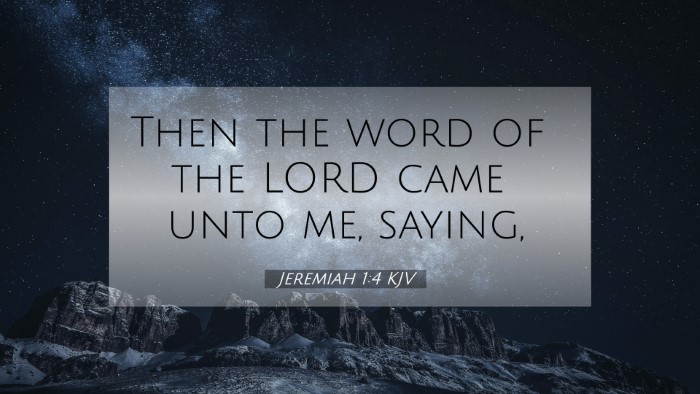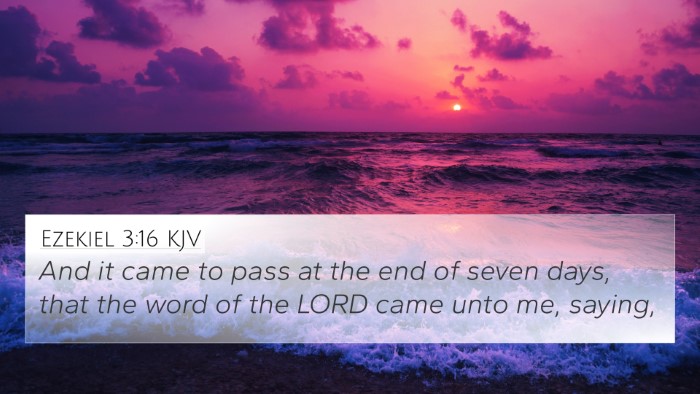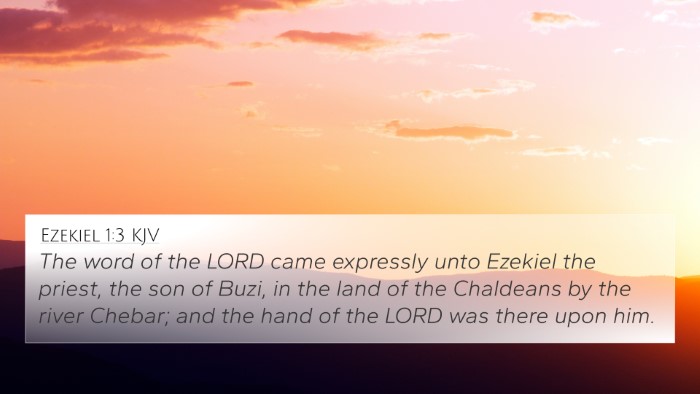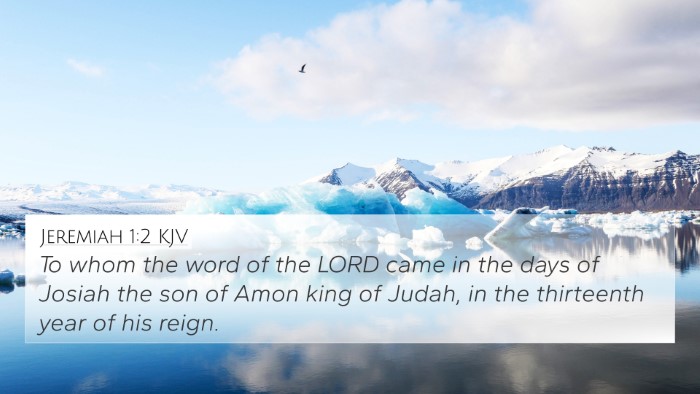Understanding Jeremiah 1:4
Bible Verse: Jeremiah 1:4
“Then the word of the Lord came unto me, saying,”
Summary of Jeremiah 1:4
Jeremiah 1:4 marks a pivotal moment where God declares His intention to communicate directly with the prophet Jeremiah. This verse establishes the divine appointment of Jeremiah as a prophet, highlighting the significance of his calling and the authority behind his message. The phrase “the word of the Lord came unto me” underscores the personal nature of God’s revelation and sets the stage for the prophetic mission that Jeremiah is about to embark on.
Insights from Public Domain Commentaries
Matthew Henry: Henry emphasizes that God's call to Jeremiah illustrates the personal relationship God desires with His prophets. The divine “word” signifies not just instruction but an intimate communication that Jeremiah is favored to receive. This indicates God's sovereign choice in selecting Jeremiah for this significant role in conveying His message to Israel.
Albert Barnes: Barnes notes that the “word of the Lord” emphasizes the certainty and authority of the message Jeremiah is to deliver. He links this calling to the broader theme of God’s relentless pursuit of His people through chosen prophets, reminding us of God's active role in human affairs and His commitment to guide and reclaim nations through His spokesmen.
Adam Clarke: Clarke provides a historical context, mentioning the urgency of God's message during a time of moral decay in Israel. He highlights how this verse begins a crucial dialogue in the Old Testament, leading to significant reforms and the restoration of God’s people. Clarke reflects on the importance of acknowledging God’s voice and the necessity of obedience to His calling.
Cross-References for Jeremiah 1:4
- Exodus 3:4: God calls Moses “out of the midst of a bush” to deliver His people.
- Isaiah 6:8: “Also I heard the voice of the Lord, saying, Whom shall I send?” highlights God’s call to service.
- Ezekiel 2:1-2: God speaks to Ezekiel, emphasizing the commission of prophets.
- Luke 1:38: Mary’s acceptance of God’s word mirrors Jeremiah's willingness to serve.
- Romans 10:14: The theme of calling continues into the New Testament, where the importance of proclaiming God’s message is emphasized.
- 1 Peter 2:9: Affirms the idea of a chosen people, echoing Jeremiah’s selection as a prophet.
- Jeremiah 20:9: Jeremiah expresses his struggle with the prophetic word in him like a fire.
- Acts 13:2: The Holy Spirit called Paul and Barnabas for ministry, paralleling Jeremiah’s experience.
- Hebrews 1:1-2: Discusses God speaking through prophets, connecting the Old Testament through the New Testament revelation.
- 2 Timothy 1:9: God calls us according to His purpose, resonating with the call of Jeremiah.
Connections Between Bible Verses
Jeremiah's calling illustrates the overarching theme of divine communication throughout the Scriptures. Each reference adds depth to the understanding of God's purpose in appointing prophets, revealing how scripture interconnects through thematic lines—such as the sovereignty of God in calling His servants and the enduring nature of His message across generations.
Tools for Bible Cross-Referencing
To facilitate deeper understanding and study of the Bible, various resources can help in cross-referencing verses:
- Bible concordance: A tool that helps locate verses and provides thematic connections.
- Bible cross-reference guide: Organizes relationships between verses, highlighting where themes converge.
- Bible cross-reference system: Allows for systematic exploration of scripture connections.
- Comprehensive Bible cross-reference materials: Expands on the linkages across both the Old and New Testaments.
Identifying Connections
In studying Jeremiah 1:4, it is crucial to learn how to identify connections between different verses effectively:
- How to find cross-references in the Bible: Look for repeated themes, phrases, or words.
- Identifying connections between Old and New Testament: Observe how prophecies are fulfilled or referenced later.
- Links between the Prophets and Apostolic teachings: Recognize how New Testament writers refer back to the Old Testament prophets.
User Intent Keywords
For those seeking to understand scripture better, here are some user intent queries:
- What verses are related to Jeremiah 1:4?
- Find cross-references for Jeremiah 1:4: Explore the connections within the text and thematic links.
- How do Jeremiah 1:4 and Isaiah 6:8 connect?
- Similarities between Jeremiah and other prophetic texts: Compare prophetic themes across the scripture.
- Bible verses that support Jeremiah's calling: Investigate how other verses affirm the prophet's mission.
Conclusion
Jeremiah 1:4 serves as a foundational moment in the prophetic ministry of Jeremiah, signifying God's direct and authoritative communication. By cross-referencing this verse with others, readers can gain deeper insight into God's ongoing dialogue with His people and the poignant themes of prophetic calling and divine purpose throughout the Bible. Understanding these connections enriches the study of scripture and demonstrates the powerful inter-Biblical dialogue that continues to inform faith and practice today.

